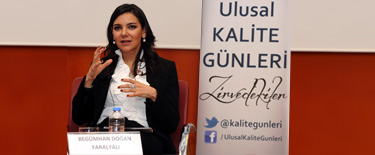Begümhan Doğan Faralyalı: “The biggest change today is the fact that capital is not what it used to be”
17.03.2014
Begümhan Doğan Faralyalı: “The biggest change today is the fact that capital is not what it used to be”
Speaking at Zirvedekiler, a panel held by the Quality and Efficiency Club at  Yıldız Technical University (YTU), Doğan Holding Chairwoman Begümhan Doğan Faralyalı responded to a question about trends that influence her by saying, “As far as I’m concerned, the biggest change is the increased significance of specialization driven by globalization, where capital is not what it used to be. People used to think that those with capital could do whatever they pleased. Money begat money. Today, the winning companies are those that focus on what they know best and make an innovative difference in whatever business they’re in.”
Yıldız Technical University (YTU), Doğan Holding Chairwoman Begümhan Doğan Faralyalı responded to a question about trends that influence her by saying, “As far as I’m concerned, the biggest change is the increased significance of specialization driven by globalization, where capital is not what it used to be. People used to think that those with capital could do whatever they pleased. Money begat money. Today, the winning companies are those that focus on what they know best and make an innovative difference in whatever business they’re in.”
“I don’t think leadership qualities have changed at all in the past 1,000 years”
Doğan Holding Chairwoman Begümhan Doğan Faralyalı was a speaker at a panel moderated by journalist Volkan Akı and held by the Quality and Efficiency Club at Yıldız Technical University (YTU) as part the 16th National Quality Days event covering “Growth Strategies and Technology in the Business World”. During her speech at the panel, Faralyalı spoke about leadership and said, “I don’t think the basic qualities of leadership have changed at all in the past 1,000 years. Meaning, whatever qualities we observed in Sultan Mehmet the Conqueror, Alexander the Great, and Atatürk, I believe we expect to see in today’s leaders as well. The first quality would be a leader with strong convictions. Dedicating one’s self to an ideal, a vision, an ideology, and having their mind and heart in it. But merely believing is not enough -- we expect the leader to be courageous, and have the gumption to spring into action and get others going as well. We also expect leaders to practice what they preach, and be trustworthy. Moreover, we expect them to be good communicators, and convince those around them to believe as they do. And of course, a leader should have emotional intelligence as well. Leaders should know themselves, know how to manage themselves, be motivated and be able to motivate, and know how to empathize.
So what has changed in these qualities that have remained the same over the past millennia? The approach has changed. Today’s leaders are much more democratic. I believe this translates into a leadership style that is fuelled by the ideas and opinions of colleagues; those whose wisdom the leader trusts, and who can add value. Back in the day, getting close to a leader was not easy. Today’s leaders are much more accessible.”
“Leaders shouldn’t be afraid of technology. They should own it, and make the best of what it provides.”
In response to a question about the “connection between technology and leadership”, Faralyalı said, “Using technology correctly is very important. In this day and age, if we use the Internet to play games all day, it would be a colossal waste of time. But if we use it to learn, to get information and to improve ourselves, it is a huge opportunity. Companies have been revolutionized thanks to the Internet and technology. Efficiency has increased dramatically, which has proven to be truly beneficial for leaders. On the other hand, technology forces companies and leaders to be more transparent, which is very important in today’s world. Leaders should not be afraid of technology as a means of communication. They should own it, and make the best of what it provides.”
“I ask a lot of questions”
Moderator Volkan Akı asked Faralyalı what kind of a leader she is. Faralyalı responded, “I ask a lot of questions. If there are six of us in a meeting, I expect the other five to form their opinions before they come. I like my colleagues to come prepared with their pre-formed opinions on the meeting’s subject matter, and to defend their opinions. We don’t always have to do what we have in mind. The greatest benefits and innovations comes from those who think differently.”
“A really good piece of advice would be this: decide what you want to do”
When asked what her best advice is for young people, Faralyalı said, “I believe everyone, especially young people, should make time to get to know themselves. What are my strengths? What are my weaknesses? What makes me happy? What makes me unhappy? If you do something you love, something that is your passion, it’s almost like you’re not working at all. On the flip side, if you don’t like what you’re doing, I don’t believe it’s possible to be successful because you lack positive energy when you go to work. Today’s young people are more in tune with this approach than we are. It seems like they’re getting it right. But there is something else that is far more important -- and that is, you get out of your work what you put into it. In his book Outliers, Malcom Gladwell talks about the “10 thousand-hour rule”. He says, “regardless of how willing you are, you cannot succeed in a particular field if you don’t toil, and put your blood, sweat, and tears into it.” In other words, hard work is essential for success.”

